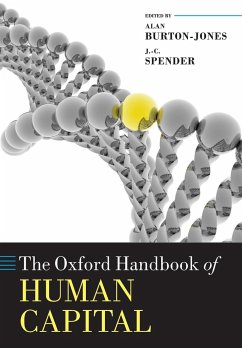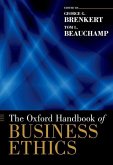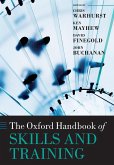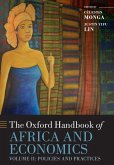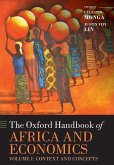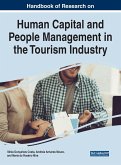- Broschiertes Buch
- Merkliste
- Auf die Merkliste
- Bewerten Bewerten
- Teilen
- Produkt teilen
- Produkterinnerung
- Produkterinnerung
This Handbook provides a much needed, authoritative, and inter-disciplinary survey of concepts, applications, and research on human capital, the stock of human capabilities and knowledge found in organizations. It is designed for scholars and graduate students in business and across the social sciences, as well as policy makers and practitioners.
Andere Kunden interessierten sich auch für
![The Oxford Handbook of Business Ethics The Oxford Handbook of Business Ethics]() George G. BrenkertThe Oxford Handbook of Business Ethics71,99 €
George G. BrenkertThe Oxford Handbook of Business Ethics71,99 €![The Oxford Handbook of Skills and Training The Oxford Handbook of Skills and Training]() The Oxford Handbook of Skills and Training63,99 €
The Oxford Handbook of Skills and Training63,99 €![The Oxford Handbook of Africa and Economics The Oxford Handbook of Africa and Economics]() The Oxford Handbook of Africa and Economics59,99 €
The Oxford Handbook of Africa and Economics59,99 €![Oxford Handbook of the Economics of Food Consumption and Policy Oxford Handbook of the Economics of Food Consumption and Policy]() Jayson L LuskOxford Handbook of the Economics of Food Consumption and Policy68,99 €
Jayson L LuskOxford Handbook of the Economics of Food Consumption and Policy68,99 €![The Oxford Handbook of Africa and Economics The Oxford Handbook of Africa and Economics]() The Oxford Handbook of Africa and Economics59,99 €
The Oxford Handbook of Africa and Economics59,99 €![Oxford Handbook of Credit Derivatives Oxford Handbook of Credit Derivatives]() Alexander LiptonOxford Handbook of Credit Derivatives69,99 €
Alexander LiptonOxford Handbook of Credit Derivatives69,99 €![Handbook of Research on Human Capital and People Management in the Tourism Industry Handbook of Research on Human Capital and People Management in the Tourism Industry]() Handbook of Research on Human Capital and People Management in the Tourism Industry336,99 €
Handbook of Research on Human Capital and People Management in the Tourism Industry336,99 €-
-
-
This Handbook provides a much needed, authoritative, and inter-disciplinary survey of concepts, applications, and research on human capital, the stock of human capabilities and knowledge found in organizations. It is designed for scholars and graduate students in business and across the social sciences, as well as policy makers and practitioners.
Hinweis: Dieser Artikel kann nur an eine deutsche Lieferadresse ausgeliefert werden.
Hinweis: Dieser Artikel kann nur an eine deutsche Lieferadresse ausgeliefert werden.
Produktdetails
- Produktdetails
- Verlag: OUP UK
- Seitenzahl: 718
- Erscheinungstermin: 22. Juli 2013
- Englisch
- Abmessung: 244mm x 170mm x 39mm
- Gewicht: 1217g
- ISBN-13: 9780199655892
- ISBN-10: 0199655898
- Artikelnr.: 35482618
- Herstellerkennzeichnung
- Produktsicherheitsverantwortliche/r
- Europaallee 1
- 36244 Bad Hersfeld
- gpsr@libri.de
- Verlag: OUP UK
- Seitenzahl: 718
- Erscheinungstermin: 22. Juli 2013
- Englisch
- Abmessung: 244mm x 170mm x 39mm
- Gewicht: 1217g
- ISBN-13: 9780199655892
- ISBN-10: 0199655898
- Artikelnr.: 35482618
- Herstellerkennzeichnung
- Produktsicherheitsverantwortliche/r
- Europaallee 1
- 36244 Bad Hersfeld
- gpsr@libri.de
Alan Burton-Jones heads an international management consultancy practice headquartered in Australia and is a senior visiting lecturer at New South Wales, Griffith and Bond Universities. His academic research focuses on the role of knowledge in organizations and the links between strategy, intellectual resources and organizational effectiveness. He is the author of Knowledge Capitalism: Business, Work and Learning in the New Economy (Oxford University Press, (1999) (Nikkei 2002) and his writings have also been published in a number of leading international journals. He contributed to the Australian government report on the knowledge-based economy in APEC countries (DISR 2000) ,the first national Knowledge Management Framework published by Standards Australia and the establishment of the Asia-Pacific Learning and Knowledge Management Council (pan-Pacific industry forum). J.-C. Spender served in experimental submarines in the Royal Navy, then studied engineering at Oxford (Balliol), worked as a nuclear submarine reactor engineer with Rolls-Royce & Associates, a sales manager with IBM (UK), a consultant with Decision Technology International (Boston), and an investment banker with Slater-Walker Securities. His PhD thesis (Manchester Business School) won the Academy of Management's 1980 A.T. Kearney PhD Research Prize, later published as Industry Recipes (Blackwell, 1989). He served on the faculty at City University, London, York University, Toronto, UCLA, and Rutgers. He was Dean of the School of Business and Technology at SUNY/FIT before retiring in 2003. He now researches, writes, and lectures on organization theory, strategy and knowledge management in the USA, Canada, and Europe, with Visiting Professor appointments at Lund University, ESADE, Cranfield, Leeds, and Open Universities.
* Part I: The Nature of Human Capital
* 1: Margaret M. Blair: An Economic Perspective on the Notion of Human
Capital
* 2: Janine Nahapiet: A Social Perspective: Exploring the Links between
Human Capital and Social Capital
* 3: Kok-Yee Ng, Mei Ling Tan and Soon Ang: Culture Capital and
Cosmopolitan Human Capital: the Impact of the Global Mindset and
Organizational Routines on Cultural Intelligence and International
Experiences
* 4: Rhett Brymer, Michael A. Hitt, and Mario Schijven: Cognition and
Human Capital: The Dynamic Interrelationship between Knowledge and
Behaviour
* 5: Peter Lewin: Critical Perspective: Reflections on the Nature and
Scope of the Concept of Capital and its Extension to Intangibles - a
Capital-Based Approach to the Firm
* Part II: Human Capital and the Firm
* 6: Nicolai J. Foss: Human Capital and Transaction Cost Economics
* 7: J.-C. Spender: Human Capital and Agency Theory
* 8: Jeroen Kraaijenbrink: Human Capital in the Resource-based View
* 9: Brian J. Loasby: Human Capital, Entrepreneurship and the Theory of
the Firm
* 10: Georg von Krogh, and Martin W. Wallin: Human Capital and the
Knowledge-based Theory of the Firm
* Part III: Human Capital and Organizational Effectiveness
* 11: Peter Boxall: Human Capital, HR Strategy and Organizational
Effectiveness
* 12: Monika Hamori, Rocio Bonet, and Peter Cappelli: How Organizations
obtain the Human Capital they need
* 13: David Lepak, Riki Takeuchi, and Juani Swart: Aligning Human
Capital with Organizational Needs
* 14: Russell Coff: Maximizing Value from Human Capital
* 15: Robin Kramar, Vijaya Murthy and James Guthrie: Accounting for
Human Capital and Organizational Effectiveness
* Part IV: Human Capital Interdependencies
* 16: Robert M. Grant and James C. Hayton: Interdependencies between
People in Organizations
* 17: David O'Donnell: Interdependencies between Human and Structural
Capital
* 18: Ikujiro Nonaka, Ryoko Toyoma, and Vesa Peltokorpi: The
Distributed and Dynamic Dimensions of Human Capital
* 19: Jacqueline C. Vischer: Human Capital and the
Organization-Accommodation Relationship
* 20: Alan Burton-Jones and Andrew Burton-Jones: Interdependencies
between People and Information Systems in Organizations
* Part V: Human Capital in the Future Economy
* 21: David J. Teece: Human Capital, Capabilities and the Firm:
Literati, Numerati, and Entrepreneurs in the 21st Century Enterprise
* 22: Peter D. Sherer: Looking to the Future: Bringing Organizations
Deeper into Human Capital Theory
* 23: Sean Ó Riain: Human Capital Formation Regimes: States, Markets
and Human Capital in an Era of Globalisation
* 24: Thomas Clarke: Supporting Human Capital in Developing Countries:
The Significance of the Asian Experience
* 25: Thomas A. Kochan and Adam Seth Litwin: The Future of Human
Capital: An Employment Relations Perspective
* 1: Margaret M. Blair: An Economic Perspective on the Notion of Human
Capital
* 2: Janine Nahapiet: A Social Perspective: Exploring the Links between
Human Capital and Social Capital
* 3: Kok-Yee Ng, Mei Ling Tan and Soon Ang: Culture Capital and
Cosmopolitan Human Capital: the Impact of the Global Mindset and
Organizational Routines on Cultural Intelligence and International
Experiences
* 4: Rhett Brymer, Michael A. Hitt, and Mario Schijven: Cognition and
Human Capital: The Dynamic Interrelationship between Knowledge and
Behaviour
* 5: Peter Lewin: Critical Perspective: Reflections on the Nature and
Scope of the Concept of Capital and its Extension to Intangibles - a
Capital-Based Approach to the Firm
* Part II: Human Capital and the Firm
* 6: Nicolai J. Foss: Human Capital and Transaction Cost Economics
* 7: J.-C. Spender: Human Capital and Agency Theory
* 8: Jeroen Kraaijenbrink: Human Capital in the Resource-based View
* 9: Brian J. Loasby: Human Capital, Entrepreneurship and the Theory of
the Firm
* 10: Georg von Krogh, and Martin W. Wallin: Human Capital and the
Knowledge-based Theory of the Firm
* Part III: Human Capital and Organizational Effectiveness
* 11: Peter Boxall: Human Capital, HR Strategy and Organizational
Effectiveness
* 12: Monika Hamori, Rocio Bonet, and Peter Cappelli: How Organizations
obtain the Human Capital they need
* 13: David Lepak, Riki Takeuchi, and Juani Swart: Aligning Human
Capital with Organizational Needs
* 14: Russell Coff: Maximizing Value from Human Capital
* 15: Robin Kramar, Vijaya Murthy and James Guthrie: Accounting for
Human Capital and Organizational Effectiveness
* Part IV: Human Capital Interdependencies
* 16: Robert M. Grant and James C. Hayton: Interdependencies between
People in Organizations
* 17: David O'Donnell: Interdependencies between Human and Structural
Capital
* 18: Ikujiro Nonaka, Ryoko Toyoma, and Vesa Peltokorpi: The
Distributed and Dynamic Dimensions of Human Capital
* 19: Jacqueline C. Vischer: Human Capital and the
Organization-Accommodation Relationship
* 20: Alan Burton-Jones and Andrew Burton-Jones: Interdependencies
between People and Information Systems in Organizations
* Part V: Human Capital in the Future Economy
* 21: David J. Teece: Human Capital, Capabilities and the Firm:
Literati, Numerati, and Entrepreneurs in the 21st Century Enterprise
* 22: Peter D. Sherer: Looking to the Future: Bringing Organizations
Deeper into Human Capital Theory
* 23: Sean Ó Riain: Human Capital Formation Regimes: States, Markets
and Human Capital in an Era of Globalisation
* 24: Thomas Clarke: Supporting Human Capital in Developing Countries:
The Significance of the Asian Experience
* 25: Thomas A. Kochan and Adam Seth Litwin: The Future of Human
Capital: An Employment Relations Perspective
* Part I: The Nature of Human Capital
* 1: Margaret M. Blair: An Economic Perspective on the Notion of Human
Capital
* 2: Janine Nahapiet: A Social Perspective: Exploring the Links between
Human Capital and Social Capital
* 3: Kok-Yee Ng, Mei Ling Tan and Soon Ang: Culture Capital and
Cosmopolitan Human Capital: the Impact of the Global Mindset and
Organizational Routines on Cultural Intelligence and International
Experiences
* 4: Rhett Brymer, Michael A. Hitt, and Mario Schijven: Cognition and
Human Capital: The Dynamic Interrelationship between Knowledge and
Behaviour
* 5: Peter Lewin: Critical Perspective: Reflections on the Nature and
Scope of the Concept of Capital and its Extension to Intangibles - a
Capital-Based Approach to the Firm
* Part II: Human Capital and the Firm
* 6: Nicolai J. Foss: Human Capital and Transaction Cost Economics
* 7: J.-C. Spender: Human Capital and Agency Theory
* 8: Jeroen Kraaijenbrink: Human Capital in the Resource-based View
* 9: Brian J. Loasby: Human Capital, Entrepreneurship and the Theory of
the Firm
* 10: Georg von Krogh, and Martin W. Wallin: Human Capital and the
Knowledge-based Theory of the Firm
* Part III: Human Capital and Organizational Effectiveness
* 11: Peter Boxall: Human Capital, HR Strategy and Organizational
Effectiveness
* 12: Monika Hamori, Rocio Bonet, and Peter Cappelli: How Organizations
obtain the Human Capital they need
* 13: David Lepak, Riki Takeuchi, and Juani Swart: Aligning Human
Capital with Organizational Needs
* 14: Russell Coff: Maximizing Value from Human Capital
* 15: Robin Kramar, Vijaya Murthy and James Guthrie: Accounting for
Human Capital and Organizational Effectiveness
* Part IV: Human Capital Interdependencies
* 16: Robert M. Grant and James C. Hayton: Interdependencies between
People in Organizations
* 17: David O'Donnell: Interdependencies between Human and Structural
Capital
* 18: Ikujiro Nonaka, Ryoko Toyoma, and Vesa Peltokorpi: The
Distributed and Dynamic Dimensions of Human Capital
* 19: Jacqueline C. Vischer: Human Capital and the
Organization-Accommodation Relationship
* 20: Alan Burton-Jones and Andrew Burton-Jones: Interdependencies
between People and Information Systems in Organizations
* Part V: Human Capital in the Future Economy
* 21: David J. Teece: Human Capital, Capabilities and the Firm:
Literati, Numerati, and Entrepreneurs in the 21st Century Enterprise
* 22: Peter D. Sherer: Looking to the Future: Bringing Organizations
Deeper into Human Capital Theory
* 23: Sean Ó Riain: Human Capital Formation Regimes: States, Markets
and Human Capital in an Era of Globalisation
* 24: Thomas Clarke: Supporting Human Capital in Developing Countries:
The Significance of the Asian Experience
* 25: Thomas A. Kochan and Adam Seth Litwin: The Future of Human
Capital: An Employment Relations Perspective
* 1: Margaret M. Blair: An Economic Perspective on the Notion of Human
Capital
* 2: Janine Nahapiet: A Social Perspective: Exploring the Links between
Human Capital and Social Capital
* 3: Kok-Yee Ng, Mei Ling Tan and Soon Ang: Culture Capital and
Cosmopolitan Human Capital: the Impact of the Global Mindset and
Organizational Routines on Cultural Intelligence and International
Experiences
* 4: Rhett Brymer, Michael A. Hitt, and Mario Schijven: Cognition and
Human Capital: The Dynamic Interrelationship between Knowledge and
Behaviour
* 5: Peter Lewin: Critical Perspective: Reflections on the Nature and
Scope of the Concept of Capital and its Extension to Intangibles - a
Capital-Based Approach to the Firm
* Part II: Human Capital and the Firm
* 6: Nicolai J. Foss: Human Capital and Transaction Cost Economics
* 7: J.-C. Spender: Human Capital and Agency Theory
* 8: Jeroen Kraaijenbrink: Human Capital in the Resource-based View
* 9: Brian J. Loasby: Human Capital, Entrepreneurship and the Theory of
the Firm
* 10: Georg von Krogh, and Martin W. Wallin: Human Capital and the
Knowledge-based Theory of the Firm
* Part III: Human Capital and Organizational Effectiveness
* 11: Peter Boxall: Human Capital, HR Strategy and Organizational
Effectiveness
* 12: Monika Hamori, Rocio Bonet, and Peter Cappelli: How Organizations
obtain the Human Capital they need
* 13: David Lepak, Riki Takeuchi, and Juani Swart: Aligning Human
Capital with Organizational Needs
* 14: Russell Coff: Maximizing Value from Human Capital
* 15: Robin Kramar, Vijaya Murthy and James Guthrie: Accounting for
Human Capital and Organizational Effectiveness
* Part IV: Human Capital Interdependencies
* 16: Robert M. Grant and James C. Hayton: Interdependencies between
People in Organizations
* 17: David O'Donnell: Interdependencies between Human and Structural
Capital
* 18: Ikujiro Nonaka, Ryoko Toyoma, and Vesa Peltokorpi: The
Distributed and Dynamic Dimensions of Human Capital
* 19: Jacqueline C. Vischer: Human Capital and the
Organization-Accommodation Relationship
* 20: Alan Burton-Jones and Andrew Burton-Jones: Interdependencies
between People and Information Systems in Organizations
* Part V: Human Capital in the Future Economy
* 21: David J. Teece: Human Capital, Capabilities and the Firm:
Literati, Numerati, and Entrepreneurs in the 21st Century Enterprise
* 22: Peter D. Sherer: Looking to the Future: Bringing Organizations
Deeper into Human Capital Theory
* 23: Sean Ó Riain: Human Capital Formation Regimes: States, Markets
and Human Capital in an Era of Globalisation
* 24: Thomas Clarke: Supporting Human Capital in Developing Countries:
The Significance of the Asian Experience
* 25: Thomas A. Kochan and Adam Seth Litwin: The Future of Human
Capital: An Employment Relations Perspective

